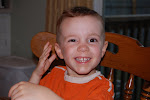Basically, the world of autism is a world of highly involved, educated parents. The operative word in this world, however, is not education or knowledge but “hope.” Many parents find that their pediatricians are not particularly hopeful, but when they move outside the mainstream they find a lot of hope. Hope that’s cultivated by stories of children who have made significant, and sometimes completely incredible, gains because the parents did not rely on what they were first told.
Actually, Cheryl has read quite a few books by parents who have be hopeful, proactive, and (as needed) pushy – and as a result, saw their child come out of autism. Or, as they say, “lose the diagnosis.”
The parent-drivenness was really highlighted for me earlier this year when Cheryl went to a conference of medical professionals (MDs and PhDs giving talks on treatment) that was populated also with educated, involved parents (mostly moms).
It was also highlighted for me – and Cheryl hates when I tell this story – when Cheryl met with a pediatrician and discussed options for Cullen. What was remarkable to me was the degree to which Cheryl spoke his language and on his level, and occasionally (sorry, Cheryl) made gentle corrections to his statements. (“Generally that test is not used in a situation like this…” “Yes, but when such and such is the case they use this test instead of that one.” “Well, that’s true.”)
You notice I highlight my wife here. That’s because she truly has been the Researcher in Residence for Cullen, reading books by leading physicians and researchers and attending “support group” meetings that are more like seminars than support groups. (We recently puzzled over an autism “support group” dramatized on a TV show. In that group, parents sat around in a circle and talked about their feelings. In the support groups we attend, parents are activists and fighters sharpening weapons for the battle against school systems and insurance companies, and sharing information on treatments, nutrition, and new studies.)
For a child with autism, the parents are the best advocates and need to be the best advocates. For a child with autism, parents need to become very, very educated—because a lot more is being learned every day, and there’s a lot of hope if you go looking for it. For a child with autism, parents need to be on top of everything from the child’s diet to the child’s doctors to the child’s therapies to the child’s playtime to the child’s… everything.
More on this soon! But the main point I wanted to make is how amazing it is that, in the world of autism, research and remedies are so significantly parent-driven. It’s exciting, but also exhausting!




1 comment:
Very well said!!!!! Cheryl (and you) have done a lot of research and because of all your hard, hard work Cullen will have a better chance at coping with life's challenges. I certainly enjoy watching him grow and change. He has come a long way so far and I know you will continue to research autism, and will not stop until he is off the "autism spectrum".
Post a Comment